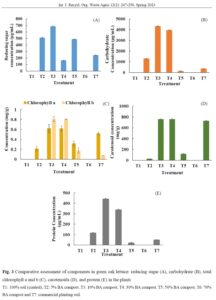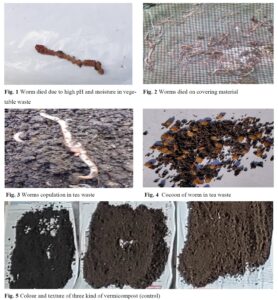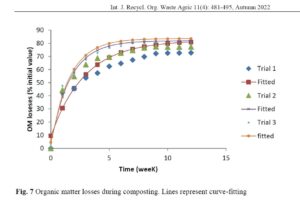Purpose: This study analyzed the ability of Black Soldier Flies Larvae (BSFL) in reducing grease waste and the effect of variation in feed composition on the growth rate effect of larvae age at 8 days, 12 days, and 16 days. Method: Before reaching the specified age (8, 12, or 16 days), the larvae are fed […]
Purpose The objective of research was emphasized on the optimal conditions (initial pH and C/N ratio) for enhancing bioenergy from food waste by a two-stage fermentation process. Methods Bioenergy production from food waste was operated by mixed culture under thermophilic temperature in batch reactor. Thermophilic biohydrogen production was optimized in terms of initial pH (5.0–9.0) […]
Purpose Food waste treatment methods have been typically analysed using current energy generation conditions. To correctly evaluate treatment methods, they must be compared under existing and potential decarbonisation scenarios. This paper holistically quantifes the environmental impacts of three food waste downstream management options—incineration, composting, and anaerobic digestion (AD). Methods The assessment was carried out using […]
Purpose Biogas residues, digestates, contain valuable nutrients and are therefore suitable as agricultural fertilizers. However, the application of fertilizers, including digestates, can enhance greenhouse gas (GHG) emissions. In this study different processes and post-treatments of digestates were analyzed with respect to triggered GHG emissions in soil. Methods In an incubation experiment, GHG emissions from two […]
Purpose Food waste can be referred to as edible food materials that can create problems to the environment if it is not disposed properly. Therefore, the purpose of this study is to produce chicken feed from food waste via two-stage fermentation. Methods Food waste was converted with combination of fungi A (isolated from degraded onion) and yeast […]
Purpose Thailand generates approximately 18 million tons of urban food waste per year, which is disposed of with municipal waste and largely goes to landfills. However, this approach not only takes up a large area but also causes environmental problems. The easiest way to manage food waste is by separating it at the source and […]

Purpose The aim of this study was to assess the potential of Eisenia fetida (Redworm) in composting different types of waste, namely tea waste (TW), vegetable waste (VW) (leaves of cauliflower), and mixed food waste (MFW). Method The experiment was set up inside the Lab room during the summer. For vermicompost preparation, 27 equal size […]

Purpose This study aimed to produce a value-added product by co-composting sawdust with food waste using a small-scale composter. Method The composting experiment was carried out using 60L composting bins with a hole of 3 mm and 10 cm apart drilled on its side. Three experimental trials 1, 2 and 3 were adopted in this […]

Purpose Source segregation of food waste is one of the major challenges that inhibit food waste recycling around the world. Therefore, the purpose of this study was to investigate the role of the local authority to implement regulations and encourage an increase in the source separation of food waste within both commercial premises and households, […]
Purpose Utilization of food waste as composting materials offers a sustainable solution to manage waste and reduce reliance on fertilizers. Method This study is focused on the efficiency of food waste compost and the effect of the addition of magnetite (Fe3O4) nanoparticles on the growth and heavy metals uptake by roselle (Hibiscus sabdarifa) for the […]